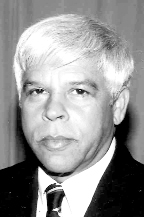-Sharma
Broadcaster CN Sharma is accusing the government of being prejudicial in its treatment of his application for a radio signal, ignoring him within recent months since a court ruling on the state monopoly on radio while also “showing little regard for my television business.”

The string of letters, which he has dispatched over the years to the National Frequency Management Unit (NFMU) and the Office of the Prime Minister, were met with infrequent responses and more recently no feedback. Sharma’s most recent letter to the NFMU was sent on November 26 and, according to him, there has been “no word yet.”
Unconfirmed reports that the NFMU has offered favourable advice with respect to a radio licence for Vieira Communications Limited (VCT), now owned by the Ramroop Group, has triggered questions among some persons with applications on file. Chief Executive Officer of the National Frequency Management Unit (NFMU) Valmikki Singh could not be reached for a comment on the matter.
The NFMU is responsible for technical evaluation of the applications and the final decision is left to government.
Sharma told Stabroek News in an interview on Thursday that he fears being sidelined “yet again,” while VCT is favoured. Previously he had complained about former VCT owner Anthony Vieira being granted permission ahead of him to import equipment to operate a relay station. He noted that his recent letter was a request to the NFMU for permission to be granted for him to import a transmitter for the purpose of relaying his television signal. “I have received numerous requests for a relay signal especially from people in Mahaica-Berbice and East Berbice-Corentyne regions. My first application for a relay signal dates to as far as 1996. The delay of such permission is causing my business great losses as a viewership is limited to only certain areas,” Sharma wrote in the recent letter to the NFMU. Sharma stressed that he needs permission to extend his business to reach the persons in the country who are interested in his programmes.
He questioned why his licence to operate Channel Six is not enough to guarantee him permission to operate a relay station, saying there are obvious attempts to frustrate his efforts. Sharma believes his status as a presidential candidate has had “much to do” with the treatment he has received over the years. The television owner said he is hard-pressed to point fingers at the NFMU because “they only advise” the government. As a result, he said he feels better placed directing his questions to the administration.
Further, Sharma asserted the government ought not to make decisions based on his political aspirations, since he is “there to serve the people.” In addition, he noted that the recent court ruling on radio licences was made “after VCT sell out,” and he said he is observing all that is happening.
In October, the CEO of the NFMU had told Stabroek News that a decision was taken to temporarily halt radio licence applications to facilitate the processing of some 60 applications currently on file. At the time, he cautioned that there are no guarantees, saying the final decision is with government. He also said the NFMU is simply responsible for technical evaluation of the applications.
He had hesitated to comment on the process of the evaluations, saying he was not “at liberty to say.” However, he noted that the processing would have to be done within a certain framework which he was also not inclined to discuss. The NFMU essentially evaluates the applications and subsequently offers its recommendations on a particular application, and the administration ultimately decides.
Singh was not prepared to offer any details on the applications on file, but he said the NFMU will soon contact the applicants as part of the processing period. He indicated that others who are interested in a radio licence have to be patient, stating that the decision to halt applications would be re-assessed in time. “I cannot say when we are going to decide on new requests, but at some point in time we will,” Singh added.
The Court of Appeal, in a landmark decision in October, ruled that the government monopoly on the airwaves is unlawful.
The Court, led by Chancellor (ag) Carl Singh and comprising Justices of Appeal BS Roy and Yonette Cummings-Edwards, allowed an appeal filed by Vieira, on behalf of VCT, ruling that VCT’s fundamental right to freedom of expression and freedom to receive and communicate ideas and information was contravened.
The Court referred to precedents in the region and other jurisdictions, while citing several authorities on the issue. Vieira has since sold his TV station to the Ramroop Group and has migrated. It has been stated that the rights and privileges which VCT enjoyed as a company were transferred to the new owners upon the sale, and this would likely include a radio licence if granted.
VCT had applied for a radio licence since 1993 and the court said that both the government and the NFMU failed to acknowledge receipt of the application. VCT had asked that the court order the NFMU to issue it with a radio licence forthwith but the Court said there are technicalities involved in making such a decision, noting that it lacks the expertise to make such an evaluation.
It said the NFMU is the entity which is well placed to make such an evaluation, and it called on the unit to “do its job.” The court did, however, direct the NFMU to consider and determine VCT’s application for a radio broadcast licence which was made since the early 1990s.









